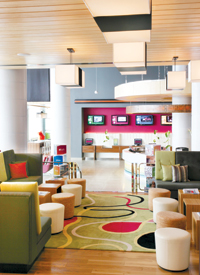
THE seventh edition of the Arabian Hotel Investment Conference 2011 (AHIC 2011) saw international and regional industry leaders debate the current performance of the hotel sector and highlight likely future trends affecting this region. On the opening day, Dr Henry Azzam, chairman of the Mena region for Deutsche Bank, provided the wider economic context and told the audience that the Arab uprisings since the start of 2011 are similar in significance to the collapse of Communism in Eastern Europe and the radical political changes in Latin America in the 1980s, but are having an uneven impact on the economies of the Middle East. 'Every $1 a barrel increase in the oil price delivers more than $3.25 billion to the Saudi Arabian Finance Ministry,' said Dr Azzam. 'That is why Saudi Arabia is going to enjoy a high rate of growth in 2011 compared with most other countries in the region.' He added that Dubai’s economy is also buoyant, explaining ‘Dubai benefits when the region does well and it benefits when the region does badly’. Focusing on the hotel sector, STR Global managing director Elizabeth Randall said that, with the exception of Middle East markets directly affected by political turbulence, the region’s hotel industry has performed well in the first quarter of 2011. Demand in most markets was up, though this has not been translated into higher room rates due to continuing supply growth across the region. Abu Dhabi saw an increase in occupancy in the first quarter of 2011 and other Middle East hotel markets growing in the same period were Al-Khobar, Jeddah and Madinah, Saudi Arabia, Doha, Qatar, Dubai, UAE, Kuwait City and Muscat, Oman. Dubai witnessed occupancy rates at about 80 per cent remaining the highest in the Middle East for the first quarter. 'For most markets, with the exception of Dubai and Abu Dhabi, supply is going to be quite constrained,' Randall said. 'Dubai is projected to have a seven per cent rise in revpar in 2011 and two per cent in 2012. This is because of people changing their travel plans away from unstable markets.' This year, the event presented the AHIC 2011 ‘Lifetime Achievement Award’ to Nasser Al Nowais, chairman of Rotana. Al Nowais was awarded for his contribution in developing Rotana into the leading regional hotel management company within the Middle East and Africa. It has rapidly expanded from just two properties in 1993 to an expected total of 70 properties by 2012. Sheikh Ahmed Bin Saeed Al Maktoum received the inaugural ‘Outstanding Achievement Award’ and Gerald Lawless executive chairman of Jumeirah Group was presented with the ‘Leadership Award’ Aloft Abu Dhabi was recognised as the region’s best new hotel Sheikh Ahmed is chairman of Dubai Airports, president of Dubai Department for Civil Aviation and chairman and CEO of Emirates airline. He was chosen by the AHIC Advisory Board in recognition of the role he has played in supporting the tourism industry in Dubai and across the region during the global economic downturn. Lawless was recognised for his success in driving Jumeirah forward in its ambition to become one of the most distinctive and innovative hospitality groups in the world. The AHIC Award for Best New Hotel went to the Aloft Abu Dhabi Hotel for its innovation in design and the range of amenities offered. The awards ceremony was held at Jumeirah Zabeel Saray Hotel and other winners were: The Phoenica InterContinental, Beirut, for Best City Centre Business Hotel; Ramada Encore Doha, for Best Economy Mid Market Hotel and the Best Luxury Resort award went to Oman’s Al Bustan Palace

InterContinental Muscat.
